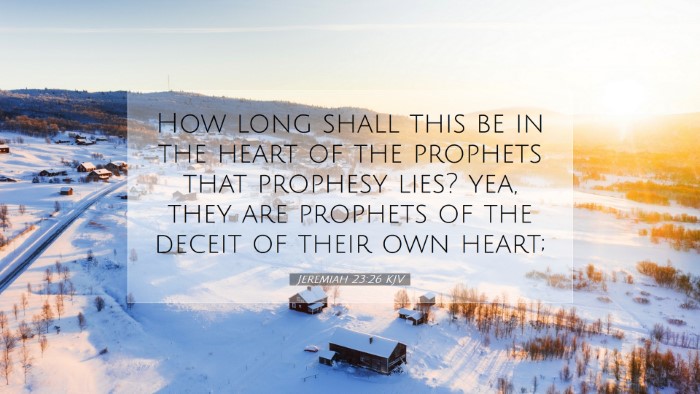Jeremiah 23:26 - Commentary
Jeremiah 23:26 (KJV) reads:
"How long shall this be in the heart of the prophets that prophesy lies? yea, they are prophets of the deceit of their own heart."
In this passage, the prophet Jeremiah speaks against false prophets and the emptiness of their prophecies, an essential theme throughout the book of Jeremiah. The tension between true and false prophecy is timely and consequential. The insights of respected commentators like Matthew Henry, Albert Barnes, and Adam Clarke provide a depth of understanding regarding the seriousness of this issue.
Matthew Henry's Insights
Matthew Henry, in his comprehensive commentary, emphasizes the deceitful nature of false prophets. He highlights that these individuals speak from the deceit of their own hearts rather than divine inspiration. For Henry, the crucial element in this verse is the source of the prophetic message:
- Heart of the Prophets: Henry notes that the heart represents not merely emotions, but the spirit and intentions behind their messages. The false prophets allow their desires and thoughts to dictate their prophecies, leading to the propagation of lies.
- Duration of Deceit: The rhetorical question posed by Jeremiah underlines the persistence of falsehood in the prophetic community. Henry urges ministers to be vigilant against such deceptions.
Albert Barnes' Perspective
Albert Barnes expands this discussion by scrutinizing the societal implications of false prophecy. He indicates that the presence of these deceitful prophets serves to mislead not only individuals but the nation as a whole.
- Misleading Authority: Barnes points out that false prophets often gain authority and a following, leading the people astray. Their influence can alter the course of nations as they distort the truth.
- Judgment and Accountability: He stresses that while these prophets may flourish for a time, they will ultimately face divine judgment for their misleading ways.
Adam Clarke's Analysis
Adam Clarke provides a historical lens through which to view this verse, noting the specific context of Jeremiah's time. Clarke's extensive notes emphasize that the culture was rife with prophets who both told the people what they wanted to hear and maintained a false sense of security.
- Context of Jeremiah: Clarke indicates that Jeremiah was amidst a populace that craved positive pronouncements, making them susceptible to false prophecy. This highlights the duality of human nature and the tendency toward self-deception.
- Call to Truth: Clarke calls for a return to the authentic word of God, contrasting the purity and authority of divine revelation with the deceptive tendencies of the heart.
Theological Implications
The theological implications of Jeremiah 23:26 are profound:
- The Nature of Prophecy: This passage interrogates what constitutes valid prophecy and suggests that it must come from a heart aligned with God rather than personal desires.
- Consequences of Misleading Doctrine: The utterances of false prophets can have significant repercussions on the faith and practice of believers, emphasizing the need for discernment.
- Role of the Church: For pastors and church leaders, there is a responsibility to guide their congregations towards truth and accountability, echoing Jeremiah’s warning.
Practical Applications
In light of these insights, there are several practical applications for contemporary audiences:
- Discernment: Believers should cultivate discernment to distinguish between true and false teachings and remain anchored in Scripture.
- Integrity in Leadership: Church leaders must strive for integrity and hold themselves accountable to God’s Word, avoiding the allure of popularity over truth.
- Community Engagement: It is vital to engage with the community truthfully, addressing spiritual needs without resorting to comforting lies.
Conclusion
Jeremiah 23:26 serves as a clarion call against the deceit that plagues not only the ancient community but also today's spiritual landscape. By engaging with the commentaries of insightful theologians, one can embrace a deeper understanding that fosters a vigilant and truth-oriented faith community. This passage reminds us of our overarching need for God’s truth in every aspect of our lives, ensuring that our hearts remain aligned with His eternal Word.


